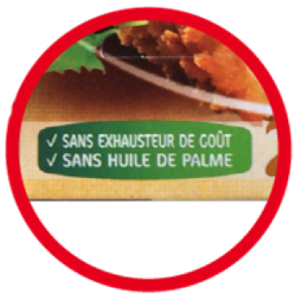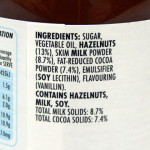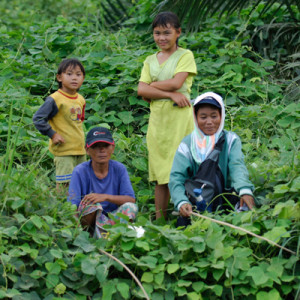The Odd Couple: RSPO Members and ‘No Palm Oil’ Label
‘No palm oil’ (NPO) labelling of some food products has become the practice of certain producers and distributors, mainly in Francophone Europe. Much has already been written about how this goes against truthfulness in advertising, consumer protection and adherence to EU and national regulations governing food labelling.
There is yet another issue – some of the companies using the NPO label are members of the Roundtable on Sustainable Palm Oil (RSPO). This makes for an awkward combination, to say the least.
The RSPO was initiated in 2004 by the World Wide Fund for Nature. Its aim is to influence the production side of palm oil in order to protect the natural habitat, avoid harmful practices like slash-and-burn agriculture, and guarantee that laws on land use and property rights are being followed. It further claims to support smallholders and provide opportunities for children, helping to prevent child labour.
RSPO members come from among palm oil producers, distributors, consumer goods manufacturers, banks and NGOs. So when member-companies advertise products with the NPO label, it has to run contradictory to the rules and standards the RSPO has set for itself.
No more than a fad?
The use of the NPO label began in 2008 when French retailer Carrefour replaced the palm oil used in its potato chips with sunflower oil.
 The Casino Group, a global leader in food retailing with over 300,000 employees and more than 14,000 stores, hopped on the bandwagon in 2010. It began selling products in its 7,000 French outlets marked with the Sans huile de palme logo (French for ‘containing no palm oil’).
The Casino Group, a global leader in food retailing with over 300,000 employees and more than 14,000 stores, hopped on the bandwagon in 2010. It began selling products in its 7,000 French outlets marked with the Sans huile de palme logo (French for ‘containing no palm oil’).
The idea quickly caught on. Companies wanted the consumer to believe that, by buying NPO-labelled products, they are acting to protect the environment; or aiding health by avoiding saturated fats.
Field research in Belgium and France in 2012 counted no less than 189 products with the NPO label. The number had almost quadrupled by 2014 when the total stood at 687. The latest available figure was 729 products in 2015; however, this also indicated a slowing-down of the trend, with an increase of only 6% compared to 2014.
Two observations stand out:
- The Casino Group in 2015 decreased the number of NPO-labelled products by a staggering 44% compared to the previous year, as the number went down from 101 to 57.
- The number of NPO products found in Belgian supermarkets – after leaping from six in 2013 to 84 in 2014 – plummeted by 51% to 41 products by the end of 2015.
In the case of Casino, the explanation was two-fold. First, the label was removed from products that carried the claim; and second, the ingredients in its other products were replaced with palm oil. In Belgium, it appears that the consumer just did not care for the labels. So more than half of these disappeared within a year.
NPO labelling is bad because it misleads consumers by playing unfairly with their sentiments. Use of the label also breaches compliance with EU food labelling regulations.
Use of label by RSPO members
MPOC research discovered that, between 2012 and 2014, a total of 17 RSPO member-companies – food manufacturers and distributors – had affixed the NPO label on their products.
This runs counter to the RSPO´s own goals and principles. Its vision is to ‘transform the markets by making sustainable palm oil the norm’. It is not the RSPO´s mission to make it the norm for products to sport the NPO label.
In addition, the RSPO states on its website: ‘Although using other vegetable oils seems like a practical solution, it would actually create similar – if not even larger – environmental and social problems. Therefore, the best solution is to ensure you buy products that contain sustainable palm oil.’
Against this backdrop, use of the NPO label by RSPO members sends out mixed signals. Isn´t it only natural for consumers to be confused when their preferred food brand proudly displays the RSPO logo and then advertises products with the NPO claim? Do these companies perhaps not trust the RSPO label?
The RSPO is called a ‘roundtable’ because it relies on a multi-stakeholder approach. The idea is that producers, traders, banks and NGOs are working together to meet the global demand for sustainably produced palm oil; and by so doing, are improving the environment.
This approach cannot work if those sitting around the table are pulling in different directions. But that is what happens when the NPO label is used.
Some stakeholders depend on producing palm oil for their livelihood. Others make money by selling processed products. What is the farmer – who puts in money and effort to produce sustainable palm oil – to think when food manufacturers replace certain products with new ones carrying the NPO label? This can only erode trust in the roundtable approach.
New rules for RSPO members
The RSPO is aware of the challenges. In January 2016, it finalised and published a reviewed version of the ‘RSPO Rules on Market Communication and Claims’ (download it here).
In the section on ‘Definitions’, the term ‘negative claims’ is defined as a ‘claim which conflicts with the stated aims of the RSPO and/or implies that the removal of palm oil from a product is a preferable social or environmental sustainability outcome to the use of certified sustainable palm oil’.
Without a doubt, the definition fits the NPO label employed by some RSPO members. It is equally clear that continued use of the label is against RSPO Rules, as well as against the RSPO Code of Conduct.
What is less clear, unfortunately, is how the RSPO intends to enforce its rules. In this matter, time is of the essence. The longer that NPO labelling is tolerated, the more damage is done in markets. For RSPO stakeholders at the production end of the value chain, this situation is not acceptable.
Even as palm oil producers suffer, consumers do not get their proper due; good governance within the RSPO is hampered; and trust among the multiple stakeholders is eroded. The RSPO needs to act urgently – for the sake of the consumer, the environment and its members; and, ultimately, in its own best interests.
MPOC Brussels










Leave a Reply